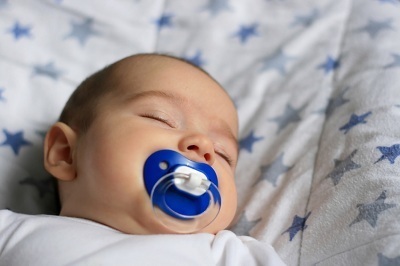Dummies
Dummies

Dummies (also known as pacifiers) have long been used by parents who feel they help soothe or settle their baby. Recently some studies have suggested they may reduce the risk of Sudden Infant Death Syndrome (SIDS).
Research has shown that sucking (e.g. breastfeeding, finger-sucking or dummy use) has a calming and soothing effect on babies, including a reduced response to pain. In addition, since the early 1990s studies have shown that dummy use is associated with a reduced risk of Sudden Infant Death Syndrome (SIDS), compared with babies who did not use a dummy.
- Two American SIDS risk studies found that dummy use is associated with a lower risk of SIDS (Li et al., 2006, Moon et al., 2012).
- One of the largest UK SIDS risk studies (Fleming et al., 1999) along with many studies elsewhere in Europe, Australasia and the Americas, have found the same association.
- However the most recent UK SIDS risk study (Blair et al. 2009) found that the importance of dummy-use in explaining SIDS risk had decreased, since the earlier large study.
Because of the strong protective effect found in some studies, some authorities now suggest that parents think about using a dummy when settling their baby to sleep. But it is not known how dummies reduce SIDS risk.
Some theories (Li et al., 2006, Horne et al., 2010) include that they may prevent babies from turning their face into bedding, alter the way babies’ hearts work, or stop them from sleeping too deeply. These theories are also among those used to explain why breastfeeding reduces SIDS risk. It might also be that there is something else – that we don’t know yet – about people who are more likely to use dummies which puts their babies at lower risk. They may, for example, be more likely to check regularly on their babies while they sleep, or to keep their babies in the same room (Mee et al., 2007)
In some of the SIDS studies it was only babies who didn’t have a dummy – but normally used one – that were more vulnerable, e.g. McGarvey et al., 2003.Those babies who never had a dummy were not at higher risk, which suggests that if you start giving your baby a dummy for sleep then you must always give it.
Studies have shown that dummy use can have unwanted effects. Some, e.g. Fleming et al., 1999. have found that dummy use can lead to less breastfeeding and earlier weaning from the breast. An up-to-date review of research (Jaafar et al., 2012) found dummies did not cause mothers to stop breastfeeding earlier (up to when their babies were 4 months old) when they were very motivated to breastfeed. However they were not able to say whether or not less motivated mothers might be disadvantaged by dummy use.
Breastfeeding in itself reduces the risk of SIDS, along with other diseases, and helps with mother-baby bonding.
Some research has found links between dummy use and tummy and chest infections, and recurrent infections of the middle ear, but the exact relationship betwee dummy use and infections is not yet clear (North et al., 1999) and recurrent infections of the middle-ear (Rovers et al., 2008).
For these reasons, along with the lack of information we have about how dummies work to reduce SIDS, and in which groups of babies they might have most effect, in the UK we do not recommend dummy use as a way of reducing the risk of SIDS.
For more detailed information about dummies, see our Health Practitioners pages, or this Factsheet from the Lullaby Trust.
